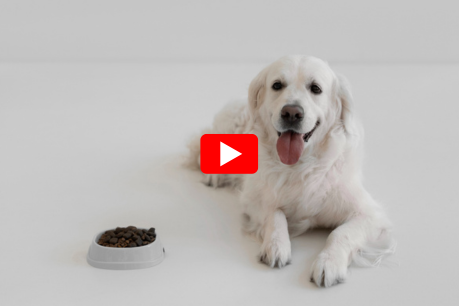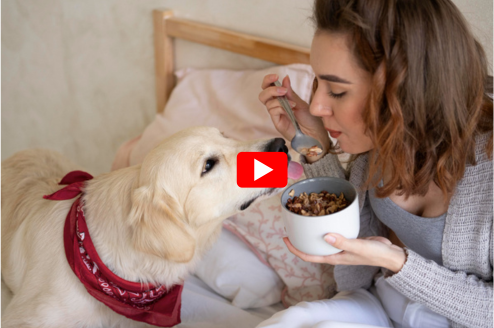Psyllium Husk For Dogs Side Effects: Symptoms, Risks & Care
When it comes to maintaining your dog’s digestive health naturally, psyllium husk often enters the conversation.
This high-fiber ingredient, derived from the outer husks of Plantago ovata seeds, can help manage constipation, diarrhea, and weight in dogs. However, as beneficial as it might be, psyllium husk isn’t completely without risks.
Like any dietary addition, introducing psyllium husk into your dog’s diet improperly can trigger side effects ranging from mild gas to serious digestive issues.
Psyllium husk can cause gas, bloating, constipation, diarrhea, or allergies in dogs if misused. Always consult a vet before adding it to their diet.
This guide will walk you through the potential side effects of psyllium husk for dogs, their causes, warning signs, and ways to prevent them.
🐾 What is Psyllium Husk?
Psyllium husk is the soluble fiber-rich outer shell of the Plantago ovata seed. Once consumed, it absorbs water and forms a gel-like texture in the stomach, which helps bulk up stools and ease their passage through the intestines.
Though commonly used as a fiber food for humans, veterinarians occasionally recommend it for dogs struggling with gastrointestinal problems.
It’s also favored for managing certain canine conditions such as anal gland issues, irritable bowel syndrome (IBS), and obesity.
But while its natural properties are helpful, dog owners need to be aware of possible side effects, especially if administered incorrectly.
🐶 Why Is Psyllium Husk Used for Dogs?
Before diving into the side effects, it’s worth understanding why many pet owners use psyllium husk for dogs. Some of its most common applications include:
-
Relieving constipation by softening and bulking stools.
-
Managing diarrhea by absorbing excess water in the intestines.
-
Helping maintain healthy anal gland function through firmer stools.
-
Assisting weight management by promoting satiety.
-
Aiding diabetic dogs in stabilizing blood sugar levels.
Despite these benefits, overuse, incorrect dosages, or sensitivity in certain dogs can result in side effects you’ll want to avoid.
🩺 Side Effects of Psyllium Husk for Dogs
Let’s now explore each potential side effect in detail.
📌 Bloating and Gas
Cause:
When psyllium husk reaches the large intestine, it ferments and produces gas as a byproduct. Dogs unaccustomed to high-fiber diets may experience excessive fermentation, resulting in uncomfortable bloating and flatulence.
Signs to Watch:
-
Swollen, hard abdomen
-
Excessive passing of gas
-
Audible stomach rumbling
-
Discomfort or restlessness
Prevention Tip:
Introduce psyllium husk gradually, starting with very small amounts, and increase the dose over several days to let the digestive system adjust.
📌 Diarrhea
Cause:
Ironically, while psyllium husk treats diarrhea, it can also trigger loose stools if given in excessive amounts or if the dog’s body reacts adversely to a sudden fiber increase.
Signs to Watch:
-
Frequent, watery stools
-
Dehydration symptoms (dry gums, lethargy)
-
Urgency in defecation
Prevention Tip:
Measure doses carefully based on your dog’s weight and health status. Ensure your pet has constant access to fresh water to avoid dehydration.
📌 Constipation
Cause:
If psyllium husk is introduced without enough water, it can thicken stools and slow down bowel movements, leading to constipation.
Signs to Watch:
-
Straining during bowel movements
-
Hard, dry stools
-
Infrequent defecation
-
Lethargy or discomfort
Prevention Tip:
Always mix psyllium husk with adequate water or wet food before feeding it to your dog. Maintain proper hydration throughout the day.
📌 Allergic Reactions
Cause:
Though rare, some dogs may develop an allergic reaction to psyllium husk. This is more likely in dogs with known sensitivities or allergies to plant-based fibers.
Signs to Watch:
-
Itchy skin
-
Rashes or hives
-
Vomiting
-
Difficulty breathing (in severe cases)
Prevention Tip:
Start with a tiny amount of psyllium husk and monitor your dog closely. Discontinue use immediately if allergic symptoms appear and consult a veterinarian.
📌 Choking Hazard
Cause:
Psyllium husk expands rapidly when exposed to moisture. If given in dry form or insufficiently mixed, it can swell in the throat and cause a choking risk.
Signs to Watch:
-
Gagging or coughing
-
Drooling
-
Difficulty swallowing
-
Pawing at the mouth
Prevention Tip:
Always mix psyllium husk into water, broth, or wet food to create a soft, gel-like mixture before offering it to your pet.
📌 Electrolyte Imbalance (Rare but Possible)
Cause:
Excessive fiber intake can cause diarrhea or frequent urination, leading to fluid and electrolyte imbalances. This condition is rare but potentially serious in dogs with underlying health issues.
Signs to Watch:
-
Muscle tremors
-
Weakness
-
Lethargy
-
Confusion or disorientation
Prevention Tip:
Consult your veterinarian for guidance, especially for senior dogs or those with chronic conditions.
🐕 Factors That Influence Psyllium Husk Side Effects in Dogs
Not all dogs react the same way to psyllium husk. Several factors can influence the likelihood and severity of side effects:
-
Age: Senior dogs may process fiber differently than younger ones.
-
Breed Size: Small breeds typically require lower doses and are more sensitive to fiber changes.
-
Health Conditions: Dogs with kidney, digestive, or metabolic disorders should be monitored closely.
-
Hydration Status: Dehydrated dogs are at a higher risk of constipation or intestinal blockages.
How to Safely Use Psyllium Husk for Dogs
To minimize side effects, follow these safety guidelines:
-
Start Slow: Introduce a small dose and gradually increase.
-
Mix Thoroughly: Always blend psyllium husk with water or moist food.
-
Ensure Hydration: Provide ample fresh water to your dog throughout the day.
-
Monitor Closely: Observe stool consistency, frequency, and any unusual symptoms.
-
Consult a Vet: Especially if your dog has pre-existing health conditions.
When to See a Veterinarian
Seek veterinary assistance if your dog shows:
-
Persistent vomiting, diarrhea, or constipation
-
Signs of severe allergic reactions
-
Difficulty breathing or swallowing
-
Excessive bloating or abdominal pain
-
Lethargy or behavioral changes
Prompt intervention can prevent minor side effects from becoming serious health concerns.
🌿Natural Alternatives to Psyllium Husk for Dogs
If your dog is sensitive to psyllium husk or experiences side effects, several natural alternatives can support digestive health:
-
Canned Pumpkin (unsweetened)
-
Mashed Sweet Potatoes
-
Cooked Carrots
-
Oat Bran
-
Chia Seeds (soaked)
Each of these can help regulate stool consistency while offering nutritional benefits.
📌 Conclusion
While psyllium husk can be a natural, effective aid for your dog’s digestive health, it’s essential to be aware of potential side effects.
Issues like bloating, gas, constipation, diarrhea, allergic reactions, and choking risks are possible, particularly with improper use or overdosage.
As with any dietary change, moderation, gradual introduction, and professional veterinary guidance are key.
By understanding the potential side effects and knowing how to prevent them, you can safely include psyllium husk in your dog’s diet when needed.
📚 References Link
- Plantago ovata
https://en.wikipedia.org/wiki/Plantago_ovatav
- Fiber for Pets
https://www.aspca.org/pet-care/animal-poison-control/toxic-and-non-toxic-plants/fiber
- Fiber in Dog Diets
https://veterinarypartner.vin.com/default.aspx?id=4952921&pid=19239
.



